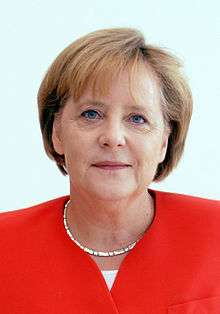Foreign policy of the Angela Merkel government
| ||
|---|---|---|
|
Revolution of 1989 Kohl Administration Leader of the Christian Democratic Union Chancellor of Germany First term
Second term
Third term
 |
||
The foreign policy of the Angela Merkel government has been the foreign policy of Germany since Merkel took office as Chancellor of Germany in November 2005. During Merkel's chancellorship, Merkel has personally been highly active in the field of the foreign policy. She named Frank-Walter Steinmeier to serve as Minister for Foreign Affairs from 2005 to 2009; the office was subsequently held by Guido Westerwelle from 2009 to 2013, and again by Steinmeier from 2013.
Merkel has emphasized international cooperation, both in the context of the European Union and NATO. Merkel played a central role in the negotiation of the Treaty of Lisbon and the Berlin Declaration. Merkel played a crucial role in managing the financial crisis at the European and international level.
Merkel has been widely described as the de facto leader of the European Union throughout her tenure as Chancellor. Merkel has twice been named the world's second most powerful person by Forbes magazine, the highest ranking ever achieved by a woman.[1][2][3][4][5][6] In December 2015, Merkel was named as Time magazine's Person of the Year, with the magazine's cover declaring her to be the "Chancellor of the Free World."[7] On 26 March 2014, Merkel became the longest-serving incumbent head of government in the European Union and she is currently the senior G7 leader. In May 2016, Merkel was named the most powerful woman in the world for a record tenth time by Forbes.[8] In 2016 Merkel was described by The New York Times as "the Liberal West's Last Defender"[9] and by Timothy Garton Ash as "the leader of the free world."[10] Following the announcement that Merkel will run for a fourth term as Chancellor, the Chairman of the Foreign Affairs Committee Norbert Röttgen has said that Merkel desires to hold "the liberal order, in the trans-Atlantic area, together" and that "the Chancellor is a cornerstone of [the] political concept of the West as acting as a global player."[11]
United States
One of Merkel's priorities was strengthening transatlantic economic relations. She signed the agreement for the Transatlantic Economic Council on 30 April 2007 at the White House. The Council, co-chaired by an EU and a US official, aims at removing barriers to trade in a further integrated transatlantic free-trade area.[12]
U.S. President Barack Obama described her at the end of 2016 as his "closest international partner" throughout his tenure as President.[13] Obama also said he would vote for Merkel if he could.[14] Obama's farewell visit to Berlin in November 2016 was widely interpreted as the passing of the torch of global liberal leadership to Merkel as Merkel was seen by many as the new standard bearer of liberal democracy since the election of Donald Trump as U.S. President.[15][16]
Upon the election of Donald Trump Merkel said that "Germany and America are tied by values of democracy, freedom and respect for the law and human dignity, independent of origin, skin colour, religion, gender, sexual orientation or political views. I offer the next president of the United States, Donald Trump, close cooperation on the basis of these values."[17] The comment was interpreted as reintegrative shaming.[18]
References
- ↑ Balasubramanyam, Ranjitha (16 September 2013). "All Eyes on Berlin". Foreign Policy Journal. Retrieved 23 September 2013.
- ↑ Gayle, Damien (18 July 2012). "50 Shades of Angela Merkel: German Chancellor's outfits recreated as Pantone colour chart (but none of them are very sexy)". Daily Mail. Retrieved 23 September 2013.
- ↑ Francis, David (22 September 2013). ""Mama" Merkel May Win Germany, But Not the Euro Zone". The Fiscal Times. Retrieved 22 September 2013.
- ↑ Wagele, Elizabeth (16 July 2012). "What Personality Type is Angela Merkel?". Psychology Today. Retrieved 23 September 2013.
- ↑ "Angela Merkel 'world's most powerful woman'". The Daily Telegraph. London. 24 August 2011.
- ↑ "Profile Angela Merkel". Forbes. 18 April 2012. Retrieved 11 September 2012.
- ↑ Gibbs, Nancy (9 December 2015). "Why Angela Merkel is TIME's Person of the Year". Retrieved 9 December 2015.
- ↑ "Angela Merkel". Forbes. Retrieved 10 July 2016.
- ↑ "Donald Trump's Election Leaves Angela Merkel as the Liberal West's Last Defender". The New York Times. 12 November 2016.
- ↑ Ash, Timothy Garton (11 November 2016). "Populists are out to divide us". The Guardian.
- ↑ http://www.independent.co.uk/news/world/europe/angela-merkel-fourth-term-germany-norbert-roettgen-a7419526.html
- ↑ "Enterprise policies" (PDF). European Council. Retrieved 11 September 2012.
- ↑ "Obama: Merkel was my closest ally". The Local. 15 November 2016.
- ↑ http://www.thelocal.de/20161117/obama-german-people-should-appreciate-merkel
- ↑ http://news.sky.com/story/has-baton-of-global-leadership-passed-from-us-to-germany-10661050
- ↑ http://www.france24.com/en/20161117-usa-germany-obama-passes-torch-merkel-farewell-tour
- ↑ (www.dw.com), Deutsche Welle. "Merkel congratulates Trump as politicians express shock | Germany | DW.COM | November 9, 2016". DW.COM. Retrieved November 9, 2016.
- ↑ "The psychological tricks Angela Merkel used against Donald Trump". 15 November 2016.
